Lukas Meßmann
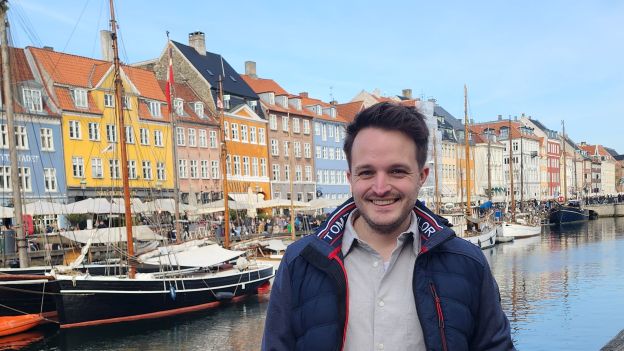 Privat
Privat
Lukas Meßmann exploring Copenhagen
“My stay at the DTU in Denmark has been a great benefit to me academically in terms of the research project on sustainability in sterile supply departments in hospitals, and professionally with respect to my ongoing academic career. It has also been of great benefit to me personally and would not have been possible without the DAAD-Stiftung's KSB Stiftung Scholarship.”
Improving sustainability in hospitals was the focus of Lukas Meßmann's postdoctoral funding period. This research was supported by the KSB Stiftung Scholarship. Apart from his projekt, he used the time in Scandinavia to explore Kopenhagen and its picturesque surroundings.
He describes his research, his adventures on the bike and other impressions like this:
Approximately two years ago, in June 2022, I defended my doctoral thesis on the environmentally and socially sustainable design of value chains, and at this time I realised I also wanted to work in the future in research, in the area of sustainability. The beginning of my postdoc period then coincided with the start of a third-party funded project on sustainability in hospitals – a subject with an instant appeal for me due to its relevance and varied research opportunities.
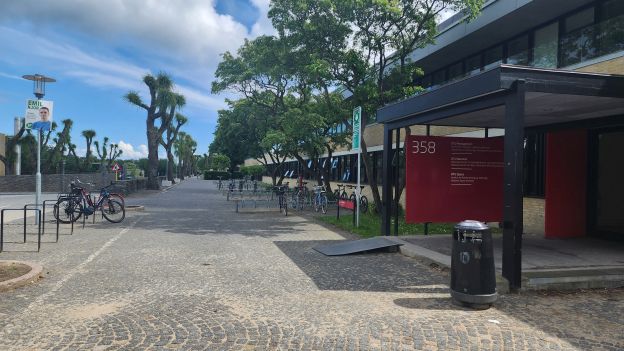
Privat
The Department of Management, Technology and Economics on the DTU campus
To then have the opportunity work to with Prof. Jens O. Brunner at the DTU (Danmarks Tekniske Universitet) in Denmark and with his doctoral candidate Robin Schlembach on the operational optimisation of procedures in central sterile supply departments in hospitals and, with the support of the KSB Stiftung Scholarship, to spend three months in Copenhagen, was obviously perfect timing both thematically and with regard to a future in research and the international experience this requires.
Central sterile supply departments (CSSDs) in hospitals are hugely significant in terms of the life cycle assessment of the respective organisation. On the one hand, they facilitate the sterilisation and reuse of medical instruments and other sterile supplies. This reduces the environmental impact of producing alternative single-use solutions and of their waste treatment.On the other hand, central sterile supply departments themselves require large amounts of electrical and thermal energy, chemical detergents and water.

Privat
The lake in Lyngby which Lukas Meßmann enjoyed while jogging
Operationally, the planning and control of a CSSD (e.g. batching and scheduling of sterile supplies) constitutes a complex decision-making problem. My task in our research project was to quantify the environmental impact of the different work stations and machines in CSSDs using the life cycle assessment (LCA) method. At the same time, my colleagues in Denmark were developing a mixed-integer optimisation model (MILP). This can be used to mathematically model an ideal CSSD and to optimise the processes in the CSSD either with regard to operational criteria (e.g. cycle times) or with regard to various environmental impacts (e.g. impact on climate change or human toxicity values).
While the MILP model preparation and the conducting of an LCA were essentially independent developments, this still required regular exchange to ensure that both development strands were focused on a jointly conceived, uniform study design and that data formats were compatible with one another.
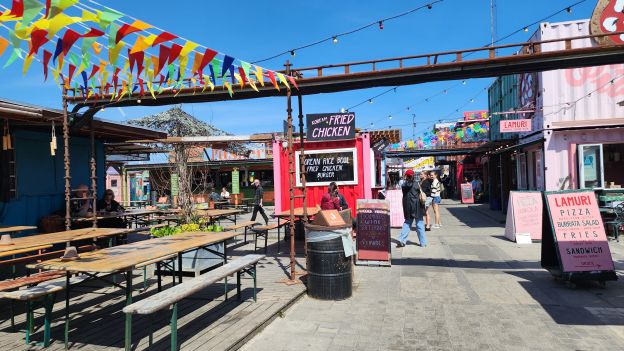
Privat
Reffen Street Food Market
At the time of this report (approximately five weeks following the end of the stay), both the quantification of the environmental parameters as well as the model development are largely complete which means we can now focus on generating and evaluating the optimisation findings. The article will then be written and submitted to a peer review journal by the end of the year. However, since my current contract ends next year and it is uncertain whether it will be extended, my hope is obviously that, overall, the publication and the valuable stay will play their part in helping me to continue my career in research.
My arrival in Denmark generally, and specifically at the DTU, went extremely smoothly. The administration office of the Management Science division, part of the Management Technology and Economics department where my host is based, had already set up a guest account for me in advance and provided a desk and the necessary equipment such as a docking station and two large monitors, and any questions I had were dealt with quickly and in a very considerate way.
Overall, my experience of the friendly but also professional working environment, the equipment and the high level of interaction at both a personal and professional level (for example with the joint research seminar) was very positive and very similar to that in Augsburg, which meant it did not take a lot of time for me to settle in. On a practical note, because I was not in Denmark for more than three months, I did not have to apply for a CPR number (the central identification number for all administrative matters and social security).
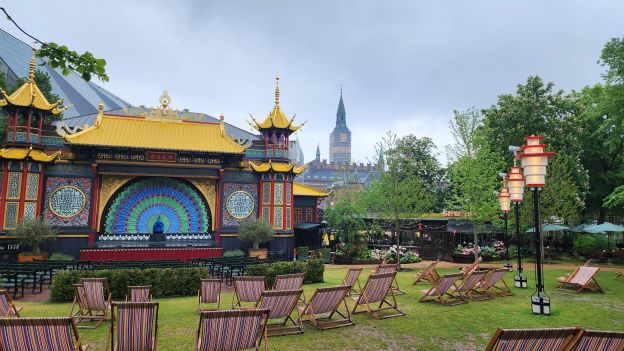
Privat
The Tivoli amusement park in Kopenhagen
During my stay, I had accommodation at ‘Basecamp Lyngby’, a privately-run student hall of residence. This might not have been the cheapest option and, compared to its larger neighbour of Copenhagen, there is not much going on in the small town of Lyngby. It was, however, the perfect choice for me due to its proximity to the DTU (a 12-minute bike ride) and above all the ease of booking (no stressful searching for a flat).
I quickly got to know the other people in the department. Although the number of Danish students, doctoral candidates, post-docs and professors was obviously in the majority, there was a very international atmosphere due to the large number of international students and other guest researchers such as myself. The fact that English was already the main language spoken in larger meetings and at lunch times and on similar occasions, and did not just have to be spoken because of me, made integrating with local colleagues very easy.
Over the three-month period I often spent time with my host's mixed group of German and Danish doctoral candidates – whether this was on Fridays in one of the various bars on the campus, at the public viewing of the European Championship football match between Germany and Denmark in Copenhagen or simply when having lunch together. The department generally placed great emphasis on the social side and on joint activities.

Privat
The Erimateg Castle in Jægersborg Dyrehave north of Kopenhagen
For example, we had a total of five teams in the relay race organised for the whole of the DTU, there was a light-hearted “Research and wine tasting” seminar, and every Friday we had breakfast together and talked about what had happened that week. Due to the relatively short period of three months and our project’s ambitious schedule, I did not attend a Danish language course during the stay – but almost everybody in Denmark already speaks good to perfect English. A number of Swedish courses I completed a few years ago were, however, of benefit to me. While Danish and Swedish could hardly be more different in terms of pronunciation, the huge similarities in terms of spelling and vocabulary meant I could generally read Danish without a problem.
Copenhagen and the entire region have a great deal to offer culturally, historically and scenically – from the “traditional” attractions such as the Tivoli amusement park in Copenhagen and Frederiksborg castle in Hillerød to Amager beach and the huge variety on offer at the Reffen street food market. Copenhagen is generally seen as a role model when it comes to sustainability – and with good reason.

Privat
The Swedish city of Helsinborg, which Lukas Meßmann visited
This is not just evident in the perfectly designed cycle paths both inside and outside the city, but also in the innovative, sustainable and fun (!) concepts such as “GreenKayak”. This involves renting out a kayak for free and in return fishing out waste from the city centre canals. And speaking of cycling, the Öresund and its Swedish coast are obviously also worth a visit.
I hired a gravel bike and cycled from Copenhagen along the coast to Helsingør on the Danish side. From here, the ferry took me across to the Swedish side to the town of Helsingborg. Having spent the night in Landskrona, I then cycled via the beautiful, small city of Lund, also a university city, to Malmö and from there I took the train over the Öresund Bridge back to Copenhagen. I highly recommend this trip!
I have taken a great deal from my stay, and on very many levels. Academically I have been able to make significant progress with our research project in collaboration with our corporation partners. This would not have been possible without the stay abroad and support from the DAAD-Stiftung. During the stay, I was able to make lots of contacts – this was also thanks to the happy coincidence that the “33rd European Conference on Operational Research” (“EURO Conference” for short), which is highly relevant to our research topic, took place at exactly the same time as my stay at the DTU.
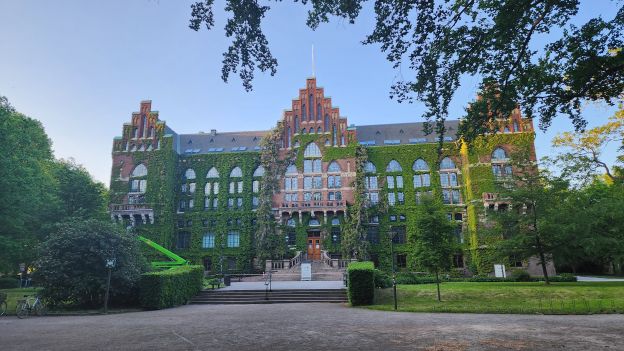
Privat
Lukas Meßmann's bike rides also took him to the Lund University building
The EURO Conference series is one of the most important and – with around 60 parallel sessions – also one of the largest international forums in the “Operations Research” community. This was the third time I had attended a EURO conference so I was able to consolidate lots of existing contacts and make lots of new ones, particularly among the group of researchers in the area of “Sustainable Supply Chains”. My successful presentation of our research project and initial results was, obviously, a particular highlight for me. And, of course, I also gained a lot personally, whether it was my experiences in Denmark, the friendships I made and not least the fact that while I was in Denmark I asked my partner to marry me.
As of August 2024. The German version is the original.


